北师大版(2019)必修第二册Unit 5 Humans and nature Lesson 3 Race to the pole 课件 (共58张PPT,内镶嵌视频)
文档属性
| 名称 | 北师大版(2019)必修第二册Unit 5 Humans and nature Lesson 3 Race to the pole 课件 (共58张PPT,内镶嵌视频) |
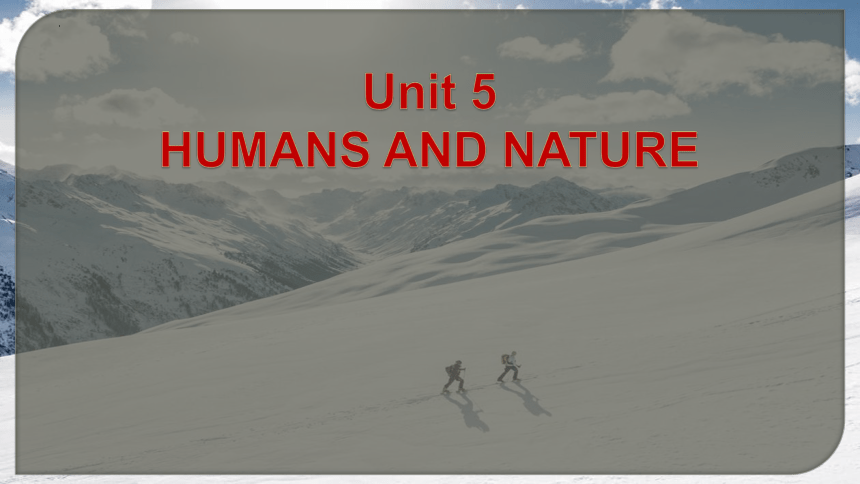
|
|
| 格式 | pptx | ||
| 文件大小 | 13.1MB | ||
| 资源类型 | 教案 | ||
| 版本资源 | 北师大版(2019) | ||
| 科目 | 英语 | ||
| 更新时间 | 2024-02-23 00:00:00 | ||
图片预览

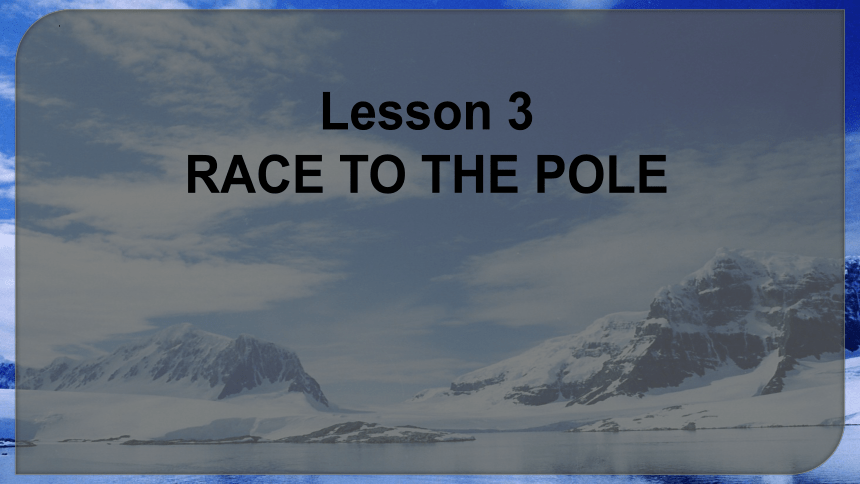

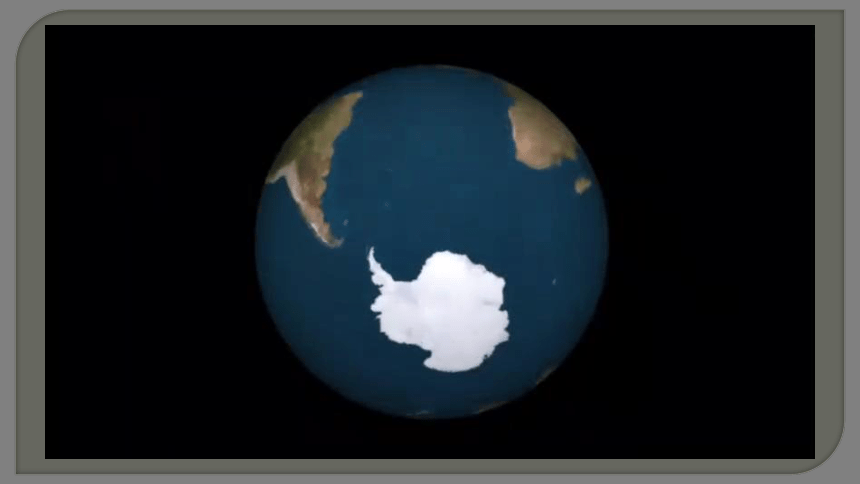
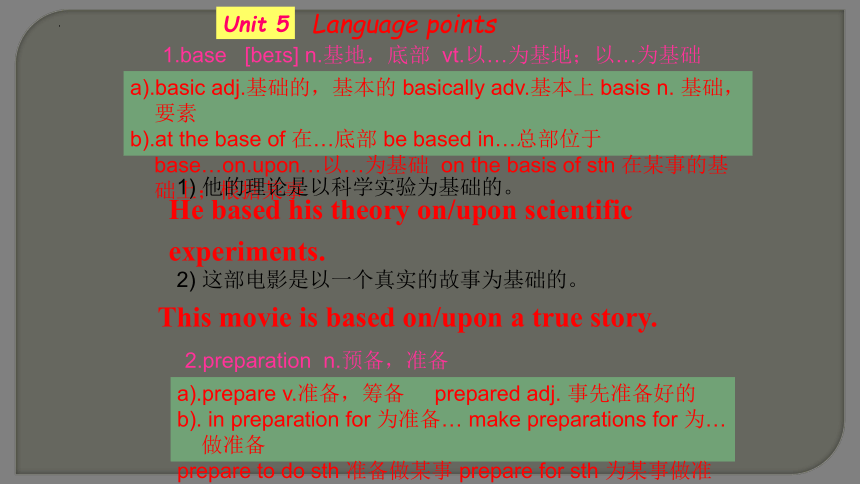


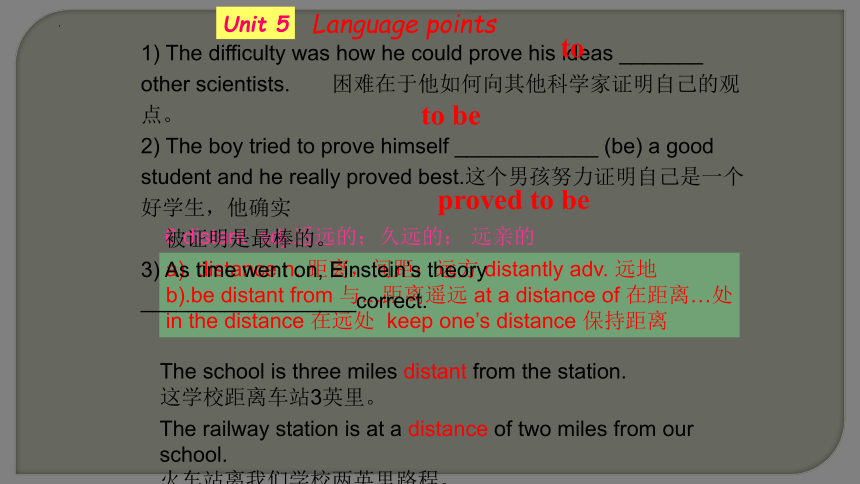

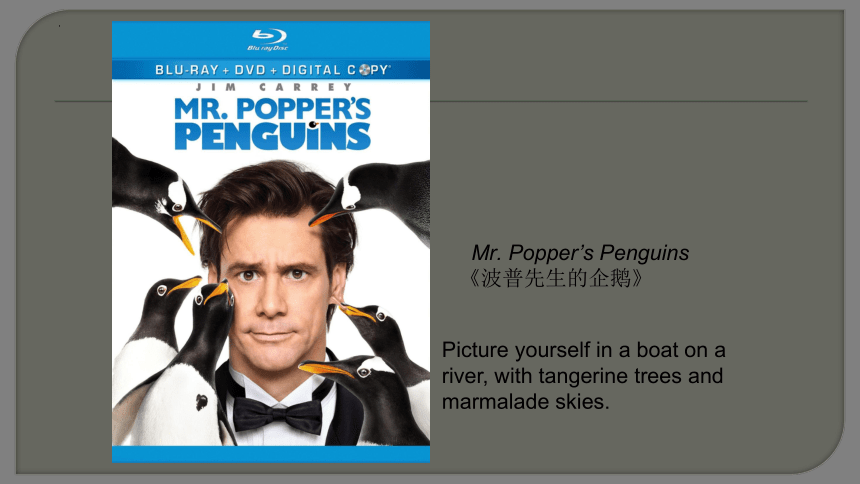
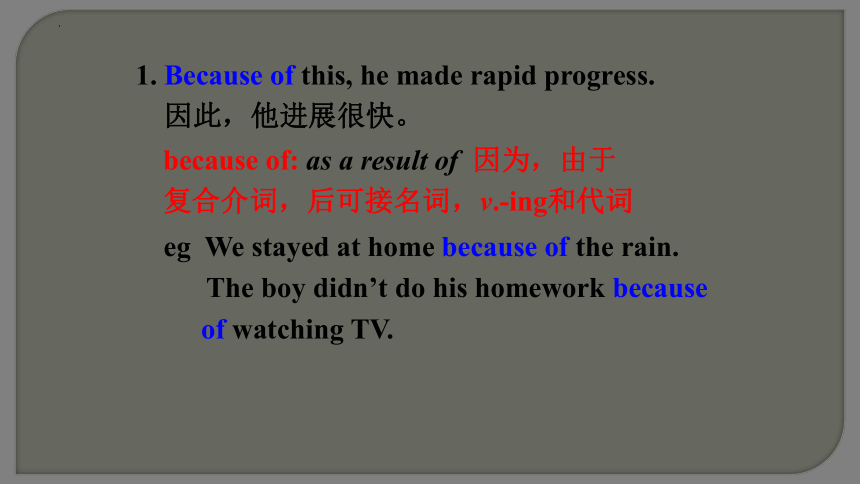
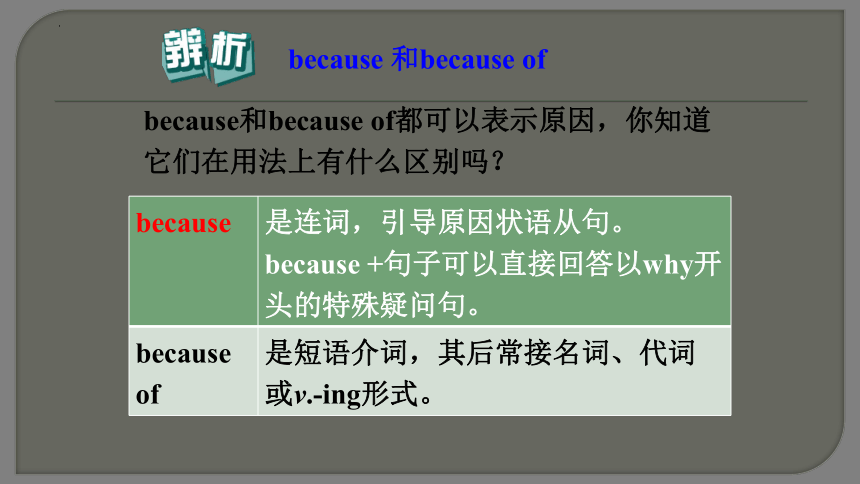
文档简介
(共58张PPT)
Unit 5
HUMANS AND NATURE
Lesson 3
RACE TO THE POLE
Eight Below
《南极大冒险》
Never underestimate any living spirits will to survive especially when they're surrounded by family..
Language points
1.base [be s] n.基地,底部 vt.以…为基地;以…为基础
a).basic adj.基础的,基本的 basically adv.基本上 basis n. 基础,要素
b).at the base of 在…底部 be based in…总部位于 base…on.upon…以…为基础 on the basis of sth 在某事的基础上;根据某事
Unit 5
2.preparation n.预备,准备
a).prepare v.准备,筹备 prepared adj. 事先准备好的
b). in preparation for 为准备… make preparations for 为…做准备
prepare to do sth 准备做某事 prepare for sth 为某事做准备
1) 他的理论是以科学实验为基础的。
2) 这部电影是以一个真实的故事为基础的。
He based his theory on/upon scientific experiments.
This movie is based on/upon a true story.
Language points
Unit 5
3.break down 停止运转,出故障,分解,(计划)失败,(身体)垮掉
a). break out(战争、火灾等)爆发break up 打碎,分裂,解体
break off 突然中断 break through 突破 break in 闯入
preparing
1) _________________(preparation) for the opening ceremony are well under way.
开幕式的准备工作正在顺利进行中。
2) Her parents were busy ______________ (prepare) to go on holiday.
她的父母正忙于准备去度假。
Preparations
(1)We are sorry to arrive late, but the car broke down.
(2)After many years, rocks break down into dirt.
(3)The plan was good, but it broke down, because they were unwilling to carry it out.
(4) If your mother continues to work like this, she will break down soon.
Language points
4.ambition n. 抱负,野心,理想
a).ambitious adj. 有野心的
b).an ambition to do sth 做某事的雄心/渴望做某事
sb’s ambitions of doing sth 某人做某事的理想
achieve/fulfil/realise an ambition 实现理想
be full of ambition 满腹雄心
be ambitious for… 对…有雄心
Unit 5
5.prove vt. 证明;证实 liking v. 最终显示为;被发现是
a).prove sth to sb 向某人证明某事 prove sb/sth (to be)+adj./n.证明某人/某物(是)… prove (that)/wh-从句 证明…
prove sb wrong/innocent 证明某人是错误的/无罪的
b).prove to be…证明是…(prove 为系动词时,不能用被动形式)
She never achieved her ambition of becoming a famous writer.
她一直未能实现当名作家的夙愿。
Language points
Unit 5
6.distant adj.遥远的;久远的; 远亲的
a). distance n. 距离,间距;远方 distantly adv. 远地
b).be distant from 与…距离遥远 at a distance of 在距离…处
in the distance 在远处 keep one’s distance 保持距离
1) The difficulty was how he could prove his ideas _______ other scientists. 困难在于他如何向其他科学家证明自己的观点。
2) The boy tried to prove himself ____________ (be) a good student and he really proved best.这个男孩努力证明自己是一个好学生,他确实
被证明是最棒的。
3) As time went on, Einstein’s theory __________________correct.
to
to be
proved to be
The school is three miles distant from the station.
这学校距离车站3英里。
The railway station is at a distance of two miles from our school.
火车站离我们学校两英里路程。
Language points
7.difficulty n. 困难;费劲;难题;难事
a).with/without difficlty 费力地,毫不费力地
have difficulties in doing sth做某事有困难
run into difficulty/difficulties 陷入困境/遇到难题
b).同义表达:have trouble/problems/a hard time (in) doing sth
Unit 5
The patient was perceived to have difficulty in breathing.
发现病人呼吸困难。
If your awareness is as sharp as it could be, you'll have no trouble answering these questions .
意识足够敏锐的话你就不会觉得这些问题很难回答。
Mr. Popper’s Penguins《波普先生的企鹅》
Picture yourself in a boat on a river, with tangerine trees and marmalade skies.
1. Because of this, he made rapid progress.
因此,他进展很快。
because of: as a result of 因为,由于
复合介词,后可接名词,v.-ing和代词
eg We stayed at home because of the rain.
The boy didn’t do his homework because of watching TV.
because 和because of
because和because of都可以表示原因,你知道它们在用法上有什么区别吗?
because 是连词,引导原因状语从句。because +句子可以直接回答以why开头的特殊疑问句。
because of 是短语介词,其后常接名词、代词或v.-ing形式。
【语境应用】根据句意选用because或because of填空。
1) Kate was late for work ____________ she
missed the early bus.
2) I didn’t go to the zoo ____________ the hot
weather.
3) —Why didn’t Mike write to Alice last month
—____________ he was very busy.
4) Ted came to this city ____________ you.
because
because of
because of
Because
1. Then came the total darkness of the polar winter.
【翻译】极地的冬季来临,四处一片黑暗。
【分析】时间副词then位于句首,谓语动词是come, go时,句子需用全部倒装。
【仿写】然后是年底最后的颁奖典礼。
________________________________________
________________________________________
Then came the final award ceremony at the end of the year.
谓语动词完全位于主语之前,为全部倒装,此时要注意句中的谓语动词单复数要与后面的主语保持一致。 全部倒装主要用于以下情况:
全部倒装
①句首是表示方向、地点、时间的now, then, here, there, out, in, up, down, away, off 等副词,主语是名词,且其后常有come, go, rush, run,begin,fall等词的时候,句子全部倒装。
Here comes the bus. /There goes the bell.
公交车来了。/铃声响了。
Now begins class. /Then began class.
现在开始上课。/然后开始上课了。
Out rushed the students.学生冲出去了。
全部倒装
②在存现句中或句首是表示地点等的介词短语且其后有不及物动词come, sit, live, stand, lie, exist 等或系动词be时,常用全部倒装。( 介词短语+不及物动词/系动词be+主语)
There stands a weather station at the top of the hill. 山顶上有一个气象站。
Behind bad luck comes good luck.塞翁失马,焉知非福。
To read and talk about the difficulties that explorers face and the preparations for them
To read for deep understanding
To summarise information
To learn to read for the implied meaning of sentences
n. 预备,准备
Antarctica (南极) — the coldest and driest continent on the Earth, 90% of which is made of ice; it’s inhabited by penguins
How much do you know about Antarctica
If you are given a chance to travel to Antarctica, will you take it Give your reasons.
If Tom want to explore Antarctica, can you give him some advice on what he can prepare for the exploration
n. 探险;探索
map
food
compass
ski
(滑雪板)
sledge (雪橇)
A team of dogs
tents
(帐篷)
warm clothes
1.Look at the photos of Antarctica. What difficulties do you think explorers may face there What preparations do they need to make
n. 探险者;勘察者
What are the temperatures like
How would you dress to deal with the weather
How would you get food
Are there civilisations close by
2.Here is an account of two teams’ journeys to the South Pole. Read the text quickly and complete the table blow.
Teams Scott’s team
when the journey began
what happened to them Reached the pole first and then returned safely.
Amundsen’s team
On 1 November, 1911
On 8 September, 1911
Arrives at the South Pole later than Amundsen’s team, and did not return
3.Read again. Complete the information about the two exploration teams. Then talk about the journeys based on your notes.
Scott’s team Amundsen’s team
Nationality of the two teams
Before the journey
British.
Norwegian.
They organised food bases.
They organised food bases.
n. 基地,大本营
Scott’s team Amundsen’s team
Journey to the destination
Two sledges broke down, the horses had difficulties with the cold. Scott and his men had to push the sledges themselves.
He had teams of dogs pulling the sledges and all his men were on skis. Because of this, he mad rapid progress.
Scott’s team Amundsen’s team
Arrival at the destination
Scott arrived at the Pole with four team members on 17 January, 1912, and was disheartened.
Amundsen reached the Pole on 14 December, 1911 and put a Norwegian flag there. Then he prepared for the return journey.
Scott’s team Amundsen’s team
The return journey
Men were very tired and were running out of food. The weather conditions were terrible. They brought rocks back for scientific evaluation. All members died.
Amundsen and his team arrived safely back to their starting base on 25 January, 1912, ten days ahead of their planned schedule.
4.Summarise the change of feelings on Scott’s team’s return journey. Give reasons for the words or phrases you have chosen.
How did Scott’s team feel at the beginning of the journey
How did they feel at the end
Why do you think this changed
hopeless and helpless (The men were tired and were running out of food.)
determined and devoted (They found time to look for rocks and carried twenty kilos of rocks all the way with them.)
sad but courageous (Edgar Evans had a terrible disease and died. The next to go was Captain Oates. We all hope to meet the end with a similar spirit.)
full of sadness, completely hopeless, sorry (A terrible storm started and they couldn’t leave their tent. Scott’s letter “tell you lots and lots about the journey” “stories for the boy” “what a price to pay”.)
5.Read the underlined sentences from Scott’s diary and letter. Work out the implied meaning of these sentences from the context. Write your inferences below.
Skill Builder
Making inferences
Sometimes things are not stated explicitly (明确地) in the text. To understand what is meant, you need to read between the lines. This is called “making inferences”.
Read the sentence / paragraph carefully.
Read the lines before and after it.
Use your logic and knowledge to understand the implied (暗含的) meaning of the text.
line 21
They lost the reason for the journey.
line 26
The men were getting weaker.
line 33
He is going to walk into the cold and die away from the team.
line 42
The journey cost the men their lives.
6-1.Would you say that Scott and his team were losers Why or why not
Even though Scott and his team lost the race to the Pole, they showed true determination and strength of character which is seen in heroes. Scott and his team are inspirational and not losers. Scott’s team had always kept their goals in mind. They carried the rocks even in extremely difficult situations. The spirit and what they have done helped followers do further research.
6-2. How do you understand Amunden’s saying about Scott’s death “Captain Scott left a record, for honesty, sincerity, for bravery, for everything that makes a man”
Captain Scott wrote a diary detailing his journey, each entry was truthful and honest. He was honest about the feelings of his team and his fears. Captain Scott and his team brought back rocks for research, they did not only think about themselves but also about the greater good of humankind and the effect of the research.
8.Read the sentences from Scott’s diary and letter again.
1 Discuss what he was trying to say in each one.
Lines 20-21: Finding Amundsen’s team had arrived early, Scott’s team felt defeated and despaired.
Lines 25-26: Each one wanted to encourage the other, but no one was really sure about what’s going to happen. They were getting weak.
Lines 33-36: Although they were facing extreme difficulties, no one wanted to show the weakness. All the team members wanted to act like a gentleman and die bravely.
Lines 41-42: Scott fully understood that they could not pull through and they came to their final time. He thought the exploration was worthwhile, but it just cost too much.
Lines 44-45: These were Scott’s last words.
2 Highlight the parts that impress you most
and explain why.
9.Discuss the following questions. Read the text again if necessary.
1 Why do you think the writer of the text used the word “race” in the title
The word “race” may have the following meanings in the text:
It’s a race between Scott’s team and Amundsen’s team to see who can get to the Pole first.
For Scott’s team, it’s a race between survival and death.
For Scott’s team, it’s also a race between the terrible condition the team face and their perseverance and bravery.
2 Why was the world shocked by Scott’s death
People were shocked by Scott’s death possibly because:
Scott and his team members died so bravely.
They didn’t give away the stones even in such bad conditions.
They got within just 11 miles of one of their food bases.
They died in the way of a gentleman.
break down
begin his journey to ...
be on the way to ...
the race to ...
in preparation for ...
be the first to leave
make rapid progress
have serious difficulties with ...
ten days ahead of their planned schedule
run out of food
have great difficulty walking
have a terrible disease
the act of a brave man
make them heroes
-tion
Can you add more words
-less
-ful
-ness
-ly
expectation
careless
organization
useless
peaceful
beautiful
happiness
kindness
quickly
happily
很多单词都是通过加前缀或后缀变成一个全新的单词,这些前缀和后缀是有规律可循的,利用前缀和后缀来记单词,记忆效率可以大幅提升。前缀改变单词词义,后缀决定单词词性。
前缀 后缀
prefix suffix
否定、方向、程度
体现单词的词性
-ful 形容词
-ment 名词
-er 名词
-ly 形容词、副词
-en 动词
dis- in- 否定
re- 相反;再次;向后
ex- 出,外;以前的
pre- 前
post- 后
后缀 意义 例词
-tion 表示“行为”,这个后缀的引申意有“行为的过程,结果,情况,性质,状态,动作”。 attention
-less 表示“无……的,不……的” homeless
-ful 表示“充满......的” shameful
-ness 表示性质、情况、状态 darkness
-ly 副词后缀,表示状态、方式、程度、方向、次序、时间等 probably
Complete the Word Builder. Then use the correct form of the words in the Word Builder to complete the sentences below.
Word Builder
Suffixes
prepare ____________
situate ___________
hope ___________
cheer ___________
explore ___________
anxious ___________
sad ___________
preparation
-tion
-less
-ful
-ness
-ly
A suffix is a letter or a group of letters that is added to the end of a word to change its meaning.
Suffixes
-tion means a state or quality, e.g. completion
-less means without, e.g. fearless
-ful means full of, e.g. helpful
-ness means a state or quality and makes a noun, e.g. kindness
-ly forms adverbs from adjectives, e.g. kindly
Word Builder
Suffixes
prepare ____________
situate ___________
hope ___________
cheer ___________
explore ___________
anxious ___________
sad ___________
preparation
-tion
-less
-ful
-ness
-ly
situation
hopeless / hopeness
cheerful
exploration
anxiously
sadness
1 Scott and Amundsen waited __________ for spring during the Antarctic winter of 1911.
2 Amundsen got to the South Pole before Scott because he had done more ____________ before leaving for the Pole.
3 Scott and his team got into a difficult __________ because their sledges broke down.
preparation situation hopeless cheerful exploration anxiously sadness
anxiously
preparation
situation
4 Scott’s team tried to stay ________ despite of all the difficulties they faced.
5 Scott experienced a great sense of _________ after realising that all of his efforts to reach the South Pole were for nothing.
6 Scott wrote about their _________ situation in his diary.
preparation situation hopeless cheerful exploration anxiously sadness
cheerful
sadness
hopeless
7 The bad weather increases the danger of their ___________.
preparation situation hopeless cheerful exploration anxiously sadness
exploration
用括号内单词的正确形式填空。
1. She was even more __________ (beauty) than I had remembered.
2. He expressed his ________ (sad) about what had happened.
3. Jerry came into the room very ________ (quiet).
beautiful
sadness
quietly
Search online the main events in China’s Antarctica exploration. Why do people try to explore the toughest part of the Earth
Unit 5
HUMANS AND NATURE
Lesson 3
RACE TO THE POLE
Eight Below
《南极大冒险》
Never underestimate any living spirits will to survive especially when they're surrounded by family..
Language points
1.base [be s] n.基地,底部 vt.以…为基地;以…为基础
a).basic adj.基础的,基本的 basically adv.基本上 basis n. 基础,要素
b).at the base of 在…底部 be based in…总部位于 base…on.upon…以…为基础 on the basis of sth 在某事的基础上;根据某事
Unit 5
2.preparation n.预备,准备
a).prepare v.准备,筹备 prepared adj. 事先准备好的
b). in preparation for 为准备… make preparations for 为…做准备
prepare to do sth 准备做某事 prepare for sth 为某事做准备
1) 他的理论是以科学实验为基础的。
2) 这部电影是以一个真实的故事为基础的。
He based his theory on/upon scientific experiments.
This movie is based on/upon a true story.
Language points
Unit 5
3.break down 停止运转,出故障,分解,(计划)失败,(身体)垮掉
a). break out(战争、火灾等)爆发break up 打碎,分裂,解体
break off 突然中断 break through 突破 break in 闯入
preparing
1) _________________(preparation) for the opening ceremony are well under way.
开幕式的准备工作正在顺利进行中。
2) Her parents were busy ______________ (prepare) to go on holiday.
她的父母正忙于准备去度假。
Preparations
(1)We are sorry to arrive late, but the car broke down.
(2)After many years, rocks break down into dirt.
(3)The plan was good, but it broke down, because they were unwilling to carry it out.
(4) If your mother continues to work like this, she will break down soon.
Language points
4.ambition n. 抱负,野心,理想
a).ambitious adj. 有野心的
b).an ambition to do sth 做某事的雄心/渴望做某事
sb’s ambitions of doing sth 某人做某事的理想
achieve/fulfil/realise an ambition 实现理想
be full of ambition 满腹雄心
be ambitious for… 对…有雄心
Unit 5
5.prove vt. 证明;证实 liking v. 最终显示为;被发现是
a).prove sth to sb 向某人证明某事 prove sb/sth (to be)+adj./n.证明某人/某物(是)… prove (that)/wh-从句 证明…
prove sb wrong/innocent 证明某人是错误的/无罪的
b).prove to be…证明是…(prove 为系动词时,不能用被动形式)
She never achieved her ambition of becoming a famous writer.
她一直未能实现当名作家的夙愿。
Language points
Unit 5
6.distant adj.遥远的;久远的; 远亲的
a). distance n. 距离,间距;远方 distantly adv. 远地
b).be distant from 与…距离遥远 at a distance of 在距离…处
in the distance 在远处 keep one’s distance 保持距离
1) The difficulty was how he could prove his ideas _______ other scientists. 困难在于他如何向其他科学家证明自己的观点。
2) The boy tried to prove himself ____________ (be) a good student and he really proved best.这个男孩努力证明自己是一个好学生,他确实
被证明是最棒的。
3) As time went on, Einstein’s theory __________________correct.
to
to be
proved to be
The school is three miles distant from the station.
这学校距离车站3英里。
The railway station is at a distance of two miles from our school.
火车站离我们学校两英里路程。
Language points
7.difficulty n. 困难;费劲;难题;难事
a).with/without difficlty 费力地,毫不费力地
have difficulties in doing sth做某事有困难
run into difficulty/difficulties 陷入困境/遇到难题
b).同义表达:have trouble/problems/a hard time (in) doing sth
Unit 5
The patient was perceived to have difficulty in breathing.
发现病人呼吸困难。
If your awareness is as sharp as it could be, you'll have no trouble answering these questions .
意识足够敏锐的话你就不会觉得这些问题很难回答。
Mr. Popper’s Penguins《波普先生的企鹅》
Picture yourself in a boat on a river, with tangerine trees and marmalade skies.
1. Because of this, he made rapid progress.
因此,他进展很快。
because of: as a result of 因为,由于
复合介词,后可接名词,v.-ing和代词
eg We stayed at home because of the rain.
The boy didn’t do his homework because of watching TV.
because 和because of
because和because of都可以表示原因,你知道它们在用法上有什么区别吗?
because 是连词,引导原因状语从句。because +句子可以直接回答以why开头的特殊疑问句。
because of 是短语介词,其后常接名词、代词或v.-ing形式。
【语境应用】根据句意选用because或because of填空。
1) Kate was late for work ____________ she
missed the early bus.
2) I didn’t go to the zoo ____________ the hot
weather.
3) —Why didn’t Mike write to Alice last month
—____________ he was very busy.
4) Ted came to this city ____________ you.
because
because of
because of
Because
1. Then came the total darkness of the polar winter.
【翻译】极地的冬季来临,四处一片黑暗。
【分析】时间副词then位于句首,谓语动词是come, go时,句子需用全部倒装。
【仿写】然后是年底最后的颁奖典礼。
________________________________________
________________________________________
Then came the final award ceremony at the end of the year.
谓语动词完全位于主语之前,为全部倒装,此时要注意句中的谓语动词单复数要与后面的主语保持一致。 全部倒装主要用于以下情况:
全部倒装
①句首是表示方向、地点、时间的now, then, here, there, out, in, up, down, away, off 等副词,主语是名词,且其后常有come, go, rush, run,begin,fall等词的时候,句子全部倒装。
Here comes the bus. /There goes the bell.
公交车来了。/铃声响了。
Now begins class. /Then began class.
现在开始上课。/然后开始上课了。
Out rushed the students.学生冲出去了。
全部倒装
②在存现句中或句首是表示地点等的介词短语且其后有不及物动词come, sit, live, stand, lie, exist 等或系动词be时,常用全部倒装。( 介词短语+不及物动词/系动词be+主语)
There stands a weather station at the top of the hill. 山顶上有一个气象站。
Behind bad luck comes good luck.塞翁失马,焉知非福。
To read and talk about the difficulties that explorers face and the preparations for them
To read for deep understanding
To summarise information
To learn to read for the implied meaning of sentences
n. 预备,准备
Antarctica (南极) — the coldest and driest continent on the Earth, 90% of which is made of ice; it’s inhabited by penguins
How much do you know about Antarctica
If you are given a chance to travel to Antarctica, will you take it Give your reasons.
If Tom want to explore Antarctica, can you give him some advice on what he can prepare for the exploration
n. 探险;探索
map
food
compass
ski
(滑雪板)
sledge (雪橇)
A team of dogs
tents
(帐篷)
warm clothes
1.Look at the photos of Antarctica. What difficulties do you think explorers may face there What preparations do they need to make
n. 探险者;勘察者
What are the temperatures like
How would you dress to deal with the weather
How would you get food
Are there civilisations close by
2.Here is an account of two teams’ journeys to the South Pole. Read the text quickly and complete the table blow.
Teams Scott’s team
when the journey began
what happened to them Reached the pole first and then returned safely.
Amundsen’s team
On 1 November, 1911
On 8 September, 1911
Arrives at the South Pole later than Amundsen’s team, and did not return
3.Read again. Complete the information about the two exploration teams. Then talk about the journeys based on your notes.
Scott’s team Amundsen’s team
Nationality of the two teams
Before the journey
British.
Norwegian.
They organised food bases.
They organised food bases.
n. 基地,大本营
Scott’s team Amundsen’s team
Journey to the destination
Two sledges broke down, the horses had difficulties with the cold. Scott and his men had to push the sledges themselves.
He had teams of dogs pulling the sledges and all his men were on skis. Because of this, he mad rapid progress.
Scott’s team Amundsen’s team
Arrival at the destination
Scott arrived at the Pole with four team members on 17 January, 1912, and was disheartened.
Amundsen reached the Pole on 14 December, 1911 and put a Norwegian flag there. Then he prepared for the return journey.
Scott’s team Amundsen’s team
The return journey
Men were very tired and were running out of food. The weather conditions were terrible. They brought rocks back for scientific evaluation. All members died.
Amundsen and his team arrived safely back to their starting base on 25 January, 1912, ten days ahead of their planned schedule.
4.Summarise the change of feelings on Scott’s team’s return journey. Give reasons for the words or phrases you have chosen.
How did Scott’s team feel at the beginning of the journey
How did they feel at the end
Why do you think this changed
hopeless and helpless (The men were tired and were running out of food.)
determined and devoted (They found time to look for rocks and carried twenty kilos of rocks all the way with them.)
sad but courageous (Edgar Evans had a terrible disease and died. The next to go was Captain Oates. We all hope to meet the end with a similar spirit.)
full of sadness, completely hopeless, sorry (A terrible storm started and they couldn’t leave their tent. Scott’s letter “tell you lots and lots about the journey” “stories for the boy” “what a price to pay”.)
5.Read the underlined sentences from Scott’s diary and letter. Work out the implied meaning of these sentences from the context. Write your inferences below.
Skill Builder
Making inferences
Sometimes things are not stated explicitly (明确地) in the text. To understand what is meant, you need to read between the lines. This is called “making inferences”.
Read the sentence / paragraph carefully.
Read the lines before and after it.
Use your logic and knowledge to understand the implied (暗含的) meaning of the text.
line 21
They lost the reason for the journey.
line 26
The men were getting weaker.
line 33
He is going to walk into the cold and die away from the team.
line 42
The journey cost the men their lives.
6-1.Would you say that Scott and his team were losers Why or why not
Even though Scott and his team lost the race to the Pole, they showed true determination and strength of character which is seen in heroes. Scott and his team are inspirational and not losers. Scott’s team had always kept their goals in mind. They carried the rocks even in extremely difficult situations. The spirit and what they have done helped followers do further research.
6-2. How do you understand Amunden’s saying about Scott’s death “Captain Scott left a record, for honesty, sincerity, for bravery, for everything that makes a man”
Captain Scott wrote a diary detailing his journey, each entry was truthful and honest. He was honest about the feelings of his team and his fears. Captain Scott and his team brought back rocks for research, they did not only think about themselves but also about the greater good of humankind and the effect of the research.
8.Read the sentences from Scott’s diary and letter again.
1 Discuss what he was trying to say in each one.
Lines 20-21: Finding Amundsen’s team had arrived early, Scott’s team felt defeated and despaired.
Lines 25-26: Each one wanted to encourage the other, but no one was really sure about what’s going to happen. They were getting weak.
Lines 33-36: Although they were facing extreme difficulties, no one wanted to show the weakness. All the team members wanted to act like a gentleman and die bravely.
Lines 41-42: Scott fully understood that they could not pull through and they came to their final time. He thought the exploration was worthwhile, but it just cost too much.
Lines 44-45: These were Scott’s last words.
2 Highlight the parts that impress you most
and explain why.
9.Discuss the following questions. Read the text again if necessary.
1 Why do you think the writer of the text used the word “race” in the title
The word “race” may have the following meanings in the text:
It’s a race between Scott’s team and Amundsen’s team to see who can get to the Pole first.
For Scott’s team, it’s a race between survival and death.
For Scott’s team, it’s also a race between the terrible condition the team face and their perseverance and bravery.
2 Why was the world shocked by Scott’s death
People were shocked by Scott’s death possibly because:
Scott and his team members died so bravely.
They didn’t give away the stones even in such bad conditions.
They got within just 11 miles of one of their food bases.
They died in the way of a gentleman.
break down
begin his journey to ...
be on the way to ...
the race to ...
in preparation for ...
be the first to leave
make rapid progress
have serious difficulties with ...
ten days ahead of their planned schedule
run out of food
have great difficulty walking
have a terrible disease
the act of a brave man
make them heroes
-tion
Can you add more words
-less
-ful
-ness
-ly
expectation
careless
organization
useless
peaceful
beautiful
happiness
kindness
quickly
happily
很多单词都是通过加前缀或后缀变成一个全新的单词,这些前缀和后缀是有规律可循的,利用前缀和后缀来记单词,记忆效率可以大幅提升。前缀改变单词词义,后缀决定单词词性。
前缀 后缀
prefix suffix
否定、方向、程度
体现单词的词性
-ful 形容词
-ment 名词
-er 名词
-ly 形容词、副词
-en 动词
dis- in- 否定
re- 相反;再次;向后
ex- 出,外;以前的
pre- 前
post- 后
后缀 意义 例词
-tion 表示“行为”,这个后缀的引申意有“行为的过程,结果,情况,性质,状态,动作”。 attention
-less 表示“无……的,不……的” homeless
-ful 表示“充满......的” shameful
-ness 表示性质、情况、状态 darkness
-ly 副词后缀,表示状态、方式、程度、方向、次序、时间等 probably
Complete the Word Builder. Then use the correct form of the words in the Word Builder to complete the sentences below.
Word Builder
Suffixes
prepare ____________
situate ___________
hope ___________
cheer ___________
explore ___________
anxious ___________
sad ___________
preparation
-tion
-less
-ful
-ness
-ly
A suffix is a letter or a group of letters that is added to the end of a word to change its meaning.
Suffixes
-tion means a state or quality, e.g. completion
-less means without, e.g. fearless
-ful means full of, e.g. helpful
-ness means a state or quality and makes a noun, e.g. kindness
-ly forms adverbs from adjectives, e.g. kindly
Word Builder
Suffixes
prepare ____________
situate ___________
hope ___________
cheer ___________
explore ___________
anxious ___________
sad ___________
preparation
-tion
-less
-ful
-ness
-ly
situation
hopeless / hopeness
cheerful
exploration
anxiously
sadness
1 Scott and Amundsen waited __________ for spring during the Antarctic winter of 1911.
2 Amundsen got to the South Pole before Scott because he had done more ____________ before leaving for the Pole.
3 Scott and his team got into a difficult __________ because their sledges broke down.
preparation situation hopeless cheerful exploration anxiously sadness
anxiously
preparation
situation
4 Scott’s team tried to stay ________ despite of all the difficulties they faced.
5 Scott experienced a great sense of _________ after realising that all of his efforts to reach the South Pole were for nothing.
6 Scott wrote about their _________ situation in his diary.
preparation situation hopeless cheerful exploration anxiously sadness
cheerful
sadness
hopeless
7 The bad weather increases the danger of their ___________.
preparation situation hopeless cheerful exploration anxiously sadness
exploration
用括号内单词的正确形式填空。
1. She was even more __________ (beauty) than I had remembered.
2. He expressed his ________ (sad) about what had happened.
3. Jerry came into the room very ________ (quiet).
beautiful
sadness
quietly
Search online the main events in China’s Antarctica exploration. Why do people try to explore the toughest part of the Earth
同课章节目录
- Unit 4 Information technology
- Lesson 1 Avatars
- Lesson 2 Apps
- Lesson 3 Internet and Friendships
- Unit 5 Humans and nature
- Lesson 1 A Sea Story
- Lesson 2 Professional Rescue Team
- Lesson 3 Race to the Pole
- Unit 6 The admirable
- Lesson 1 A Medical Pioneer
- Lesson 2 History Makers
- Lesson 3 The Superhero Behind Superman
